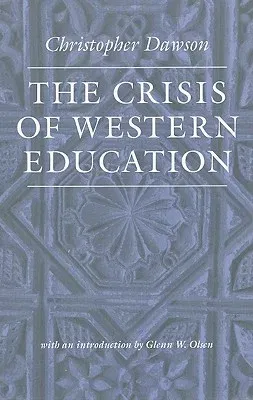The Crisis of Western Education, originally published in 1961, served
as a capstone of Christopher Dawson's thought on the Western educational
system. Long out of print, the book has now been updated with a new
introduction by Glenn W. Olsen and is included in the ongoing Works of
Christopher Dawson series. In all of his writings, Dawson masterfully
brings various disciplinary perspectives and historical sources into a
complex unity of expression and applies them to concrete conditions of
modern society.
Dawson argued that Western culture had become increasingly defined by a
set of economic and political preoccupations ultimately hostile to its
larger spiritual end. Inevitably, its educational systems also became
increasingly technological and pragmatic, undermining the long standing
emphasis on liberal learning and spiritual reflection which were
hallmarks of the Christian humanism that created it.
In this important work on the Western educational system, Dawson traces
the history of these developments and argues that Western civilization
can only be saved by redirecting its entire educational system from its
increasing vocationalism and specialization. He insists that the
Christian college must be the cornerstone of such an educational reform.
However, he argued that this redirection would require a much more
organic and comprehensive study of the living Christian tradition than
had been attempted in the past.
Dawson had reservations about educational initiatives that had been
developed in response to this crisis of education. Among them, he
expressed doubts about newly emerging great books programs fearing that
they would reduce the great tradition of a living culture to a set of
central texts or great ideas. In contrast, he insisted that a Christian
education had to be concerned with "how spiritual forces are transmitted
and how they change culture, often in unexpected ways." This would
require an understanding of the living and vital character of culture.
As Dawson saw it, "culture is essentially a network of relations, and it
is only by studying a number of personalities that you can trace this
network." Dawson offers a diagnosis of modern education and proposes the
retrieval of an organic and living culture which alone has the power to
renew Western culture.
ABOUT THE AUTHOR:
Widely praised as one of the most important Catholic historians of the
twentieth century, Christopher Dawson (1889-1970) was author of numerous
books, articles, and scholarly monographs. He was lecturer in the
History of Culture, University College, Exeter; Gifford lecturer;
Charles Chauncey Stillman Chair of Roman Catholic Studies at Harvard
University from 1958 to 1962; and editor of the Dublin Review.
PRAISE FOR THE BOOK:
"There are a handful of books that I wish I could get colleagues in the
field of education to read, and this is one of them. The reissuing of
Dawson's accessible The Crisis of Western Education (originally
published 1961) is still relevant and, sadly, still being ignored.
Dawson's insights are masterfully presented by his unusual use of the
tools of sociology, cultural history, and religious studies. . . . Most
impressively, throughout the work Dawson, better than most, defines and
chronicles the process of secularization in the West and its influence,
especially within education. . . . This helpful and insightful book is a
unique blend of cultural history, philosophy, and deeply informed
Christian thinking about the flow of Western history and what has
happened to education within that heritage."--Robert M. Woods, Journal
of Education and Christian Belief

